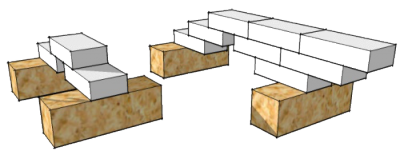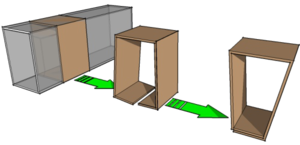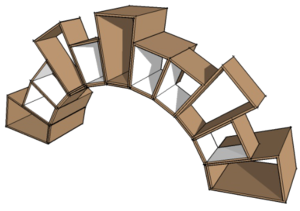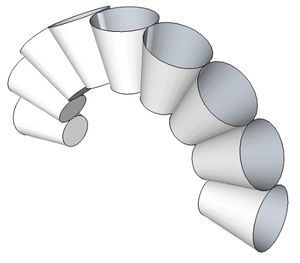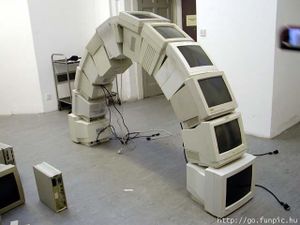Making Model Arches: Difference between revisions
From DT Online
m (Created Category) |
mNo edit summary |
||
| (12 intermediate revisions by the same user not shown) | |||
| Line 1: | Line 1: | ||
[[File:LoadedCardArch.png |400px|right]] | [[File:LoadedCardArch.png |400px|right]] | ||
__TOC__ | |||
=====Description===== | |||
Arches are simple structures which are very good at transmitting applied loads down to the ground as compressive forces. This avoids putting materials in tension and so can be built out of readily available but brittle materials such as brick or stone | Arches are simple structures which are very good at transmitting applied loads down to the ground as compressive forces. This avoids putting materials in tension and so can be built out of readily available but brittle materials such as brick or stone | ||
A simple arch can be modelled by curving a piece of thin card against two supports. Loads applied to the top of the arch are carried through the arch to the ground where they push out against the supports - or [ | A simple arch can be modelled by curving a piece of thin card against two supports. Loads applied to the top of the arch are carried through the arch to the ground where they push out against the supports - or [http://en.wikipedia.org/wiki/Abutment '''abutments''']. | ||
The importance of abutments to resist the side forces, or thrust, can be explored by trying different weights of block for the supports as the card arch is loaded. | The importance of abutments to resist the side forces, or thrust, can be explored by trying different weights of block for the supports as the card arch is loaded. | ||
=====Corbel Arch===== | =====Corbel Arch===== | ||
[[File:ClapperModels500px.png|400px|right]] | [[File:ClapperModels500px.png|400px|right]] | ||
A simple stone slab can be used to span wider gaps if it is placed on top of others, each one projecting out a little more than the one below - to form a | A simple stone slab can be used to span wider gaps if it is placed on top of others, each one projecting out a little more than the one below - to form a [http://en.wikipedia.org/wiki/Corbel_arch '''Corbel Arch''']. | ||
| Line 23: | Line 24: | ||
</span> | </span> | ||
---- | ---- | ||
But the | But the [http://en.wikipedia.org/wiki/Corbel_arch '''Corbel Arch'''] is also known as a '''''false arch''''' because it is not self-supporting and does not transmit all of the applied load as compressive forces. | ||
=====Using Card Boxes===== | =====Using Card Boxes===== | ||
[[File:BoxVoussiors500px.png|300px|right]] | [[File:BoxVoussiors500px.png|300px|right]] | ||
A representation of a true arch can be modelled by making [ | A representation of a true arch can be modelled by making [http://en.wikipedia.org/wiki/Voussoir '''voussoirs'''] out of card boxes as follows: | ||
[[File:CardBoxArch.png|300px|right]] | [[File:CardBoxArch.png|300px|right]] | ||
*cut out sections across a range of small boxes ''(they should be of similar size but do not need to be the same)'' | *cut out sections across a range of small boxes ''(they should be of similar size but do not need to be the same)'' | ||
*cut along the centre of one side | *cut along the centre of one side | ||
*it is a good idea to turn the card boxes inside out to present a clean outer surface for gluing - and perhaps painting. | *it is a good idea to turn the card boxes inside out to present a clean outer surface for gluing - and perhaps painting. | ||
*re-glue to form a [ | *re-glue to form a [http://en.wikipedia.org/wiki/Isosceles_trapezoid trapezium] shape. | ||
*make number of card [ | *make number of card [http://en.wikipedia.org/wiki/Voussoir '''voussoirs'''] in this way then assemble them to form an arch - you should not need to glue them together for the arch to stand up. | ||
[[File:WoodBlockVoussiors500px.png|300px|right]] | [[File:WoodBlockVoussiors500px.png|300px|right]] | ||
*an alternative method of making simple [ | *an alternative method of making simple [http://en.wikipedia.org/wiki/Voussoir '''voussoirs'''] is to cut short lengths of thin '''[[:Category:Stripwood Technology|Stripwood]]''', tape them together at one end and glue on a piece of thick card at the other to form [http://en.wikipedia.org/wiki/Isosceles_trapezoid trapezium] shapes. | ||
*for completeness, and increased strength, card facings can be glued on using either method, | *for completeness, and increased strength, card facings can be glued on using either method of making [http://en.wikipedia.org/wiki/Voussoir '''voussoirs'''], | ||
Stone masons used a wooden frame to support the stones until the arch was completed. This was called [ | Stone masons used a wooden frame to support the stones until the arch was completed. This was called [http://en.wikipedia.org/wiki/Centring '''centring'''] or [http://en.wikipedia.org/wiki/Falsework '''falsework''']. You may need to curve a strip of card to support the wedge shaped blocks until the arch is completed. | ||
| Line 51: | Line 52: | ||
---- | ---- | ||
<span style="color: green">'''Note:''' | <span style="color: green">'''Note:''' | ||
Arches | Arches often have a central [http://en.wikipedia.org/wiki/Voussoir '''voussoirs'''] known as the [http://en.wikipedia.org/wiki/Keystone_%28architecture%29 ''''keystone''''] and therefore an odd number of [http://en.wikipedia.org/wiki/Voussoir '''voussoirs'''] if they are all the same size. The [http://en.wikipedia.org/wiki/Keystone_%28architecture%29 ''''keystone''''] is usually the last stone positioned but has no other significance - all [http://en.wikipedia.org/wiki/Voussoir '''voussoirs'''] are needed to maintain the arch. | ||
</span> | </span> | ||
---- | ---- | ||
=====Arches from 'found' materials===== | =====Arches from 'found' materials===== | ||
More unusual arch (or dome) models may be created using 'found' materials - e.g. paper cups and old TV monitors! | {| | ||
|- | |||
| img align="right"|[[File:PaperCups500px.jpg|center|300px]] | |||
| [[File:PCMonitorArch.jpg|center|300px|link=http://www.eschertile.com/kids/math-art.htm]] | |||
|} | |||
More unusual arch ''(or dome)'' models may be created using 'found' materials - e.g. paper cups and old TV monitors! | |||
=====Arches Ancient and Modern===== | |||
We may not know who first constructed an arch but '''[[:Category:The Romans|Romans]]''' certainly became expert at building stone arch bridges across rivers. The fact that some still stand today is proof that the arch works! | |||
Since these early beginnings there has developed many '''[[Arch Variations|variations in stone arch design]]''' and, as materials such as steel and reinforced concrete became more commonly used, an even greater variety of '''[[Arch Bridges]]''' evolved. | |||
The shape of the arch is not limited to a simple semi-circle, as used originally, and modern arch bridges are based on mathematical curves such as an '''[[Ellipse]]''' or '''[[Parabola]]'''. The '''[[Catenary Arch Model|Catenary Arch]]''' is based on the curve of a hanging washing line and can be '''[[Catenary Arch Model|modelled]]''' quite easily. | |||
{{Card Modelling Buyers Guide}} | |||
[[Category:Primary Technology]] | |||
[[Category:Topics, Projects and Tasks]] | |||
[[Category:Structures Tasks]] | [[Category:Structures Tasks]] | ||
[[Category:Bridges]] | |||
Latest revision as of 08:51, 22 January 2018
Description
Arches are simple structures which are very good at transmitting applied loads down to the ground as compressive forces. This avoids putting materials in tension and so can be built out of readily available but brittle materials such as brick or stone
A simple arch can be modelled by curving a piece of thin card against two supports. Loads applied to the top of the arch are carried through the arch to the ground where they push out against the supports - or abutments.
The importance of abutments to resist the side forces, or thrust, can be explored by trying different weights of block for the supports as the card arch is loaded.
Corbel Arch
A simple stone slab can be used to span wider gaps if it is placed on top of others, each one projecting out a little more than the one below - to form a Corbel Arch.
Try it with small building blocks or dominoes to bridge a gap wider than they are long.
Note: Extra weight, a counter-weight, is needed at the supports to make it work. In practice, this would be provided by the walls above.
But the Corbel Arch is also known as a false arch because it is not self-supporting and does not transmit all of the applied load as compressive forces.
Using Card Boxes
A representation of a true arch can be modelled by making voussoirs out of card boxes as follows:
- cut out sections across a range of small boxes (they should be of similar size but do not need to be the same)
- cut along the centre of one side
- it is a good idea to turn the card boxes inside out to present a clean outer surface for gluing - and perhaps painting.
- re-glue to form a trapezium shape.
- make number of card voussoirs in this way then assemble them to form an arch - you should not need to glue them together for the arch to stand up.
- an alternative method of making simple voussoirs is to cut short lengths of thin Stripwood, tape them together at one end and glue on a piece of thick card at the other to form trapezium shapes.
- for completeness, and increased strength, card facings can be glued on using either method of making voussoirs,
Stone masons used a wooden frame to support the stones until the arch was completed. This was called centring or falsework. You may need to curve a strip of card to support the wedge shaped blocks until the arch is completed.
Questions:
- What happens of you gently press down on the centre?
- What happens if you press on the bridge from the side?
- What angle should the wedges be to build an arch using nine blocks?
- What angles for eighteen block and twenty four block arches?
Note: Arches often have a central voussoirs known as the 'keystone' and therefore an odd number of voussoirs if they are all the same size. The 'keystone' is usually the last stone positioned but has no other significance - all voussoirs are needed to maintain the arch.
Arches from 'found' materials
More unusual arch (or dome) models may be created using 'found' materials - e.g. paper cups and old TV monitors!
Arches Ancient and Modern
We may not know who first constructed an arch but Romans certainly became expert at building stone arch bridges across rivers. The fact that some still stand today is proof that the arch works!
Since these early beginnings there has developed many variations in stone arch design and, as materials such as steel and reinforced concrete became more commonly used, an even greater variety of Arch Bridges evolved.
The shape of the arch is not limited to a simple semi-circle, as used originally, and modern arch bridges are based on mathematical curves such as an Ellipse or Parabola. The Catenary Arch is based on the curve of a hanging washing line and can be modelled quite easily.

